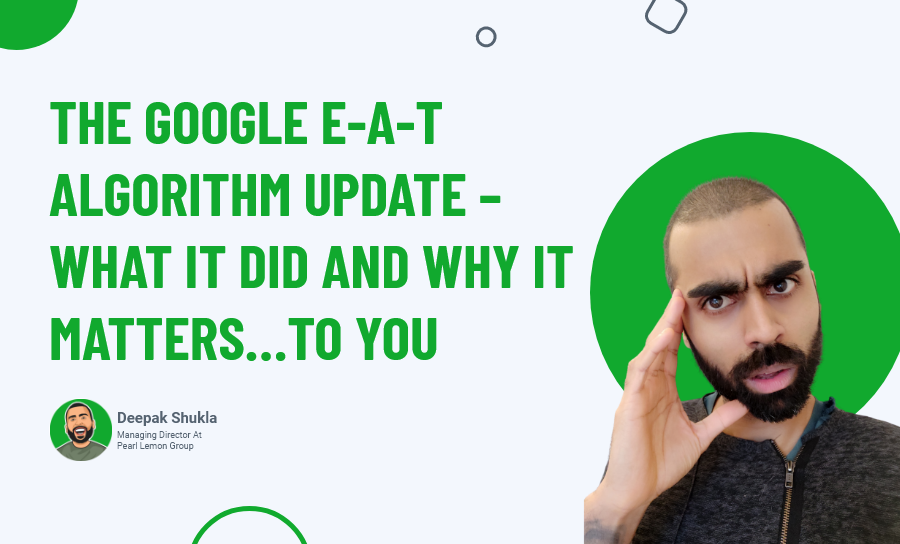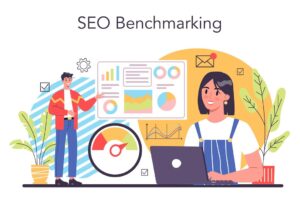Google and their algorithm changes. One of the biggest reasons freelance SEO consultants like myself are well known for ending their days in the bar. All joking aside (although it’s not actually a joke), one of the biggest challenges for any SEO expert, SEO agency and indeed for any webmaster, is keeping up with the algorithm updates that are made to the way that Google ranks websites on an almost daily basis.
It’s the major changes that really have a big impact on the lives of webmasters, business owners who rely on those websites and SEO practitioners who try to help these people rank their sites, and their content, as high in the SERPs as possible though. And the Google E-A-T algorithm update was no exception.
While the E-A-T update didn’t make as huge of an impact in terms of media and industry coverage as others have in the past (think the first Penguin and Panda updates years ago and more recently Mobilegeddon) it did come along with important implications that you should know about, lessons you need to learn and actions you really should be taking.
For these reasons, it’s time to take a deeper dive into just what the Google E-A-T algorithm update is, what its effects on search have been and what you can do to help ensure that your site continues to perform as well in the SERPs as you need it to.
So, let’s dive right in…
What the Hell Is The Google E-A-T Algorithm Update Anyway?
First things first, this update did not just happen. News of its pending arrival actually began to surface in August 2018, when various SEO experts began noticing some significant fluctuations in search rankings. Then Google, in a move they very rarely make, went ahead and announced that a broad update was coming (queue the mad rush to to the pub after this tweet was sent by half of the SEO industry)
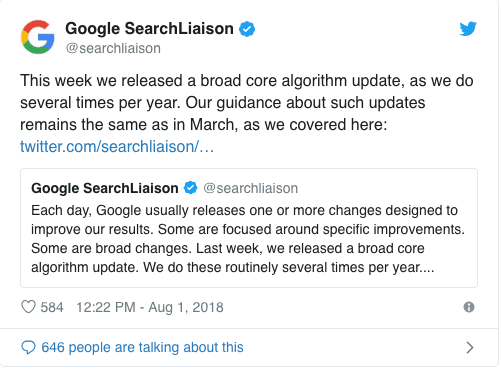
So what happened? What has happened since? And what does it mean for you?
YMYL Pages Took a Big Hit
Not sure what YMYL pages are? It’s OK, lots of people weren’t before this all went down. YMYL is an acronym the Big G itself uses for ‘your money or your life’ and it’s a term that they use to describe.

…] Types of pages [that] could potentially impact the future happiness, health, financial stability, or safety of users. — Google Quality Raters Guidelines
The then unnamed update had a big impact on many of those pages right away.
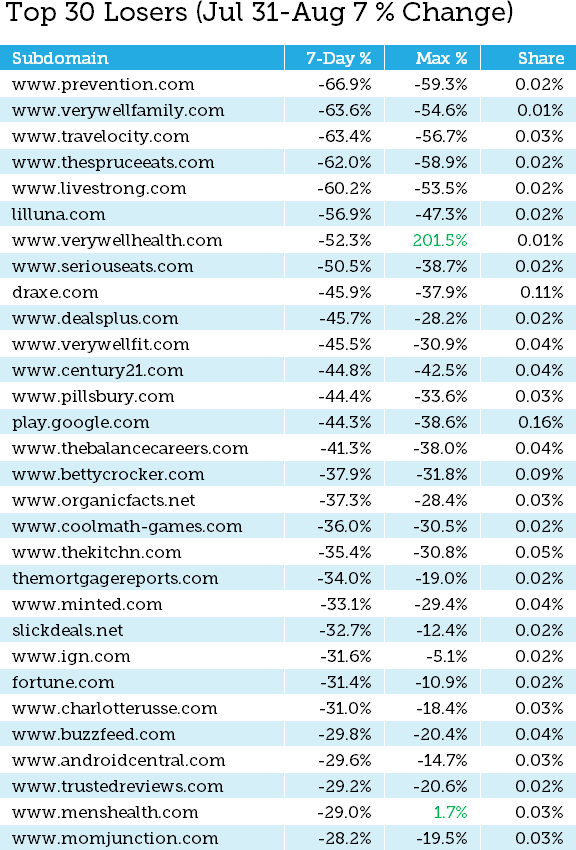
Looking at the charts you can see that some pages saw a 50% drop in visitors in DAYS, even big names like Prevention and Livestrong. Almost immediately those who cared to look (ie: anyone who could possibly claim to have a serious interest in providing SEO advice) could see that the sites that had been most affected were those in the nutrition, wellness, health, fitness and medical niches. Which is why the update was branded the Medic Update initially.
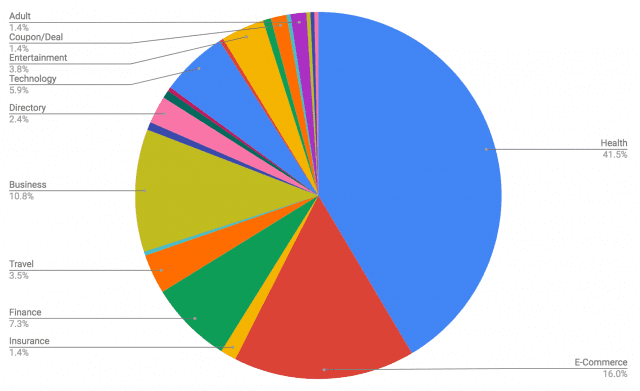
A deeper dive – and a few more weeks of analytics – and it became obvious that finance, e-commerce and consulting type businesses were being affected as well. That’s when the penny began to drop as SEO folks began to realise this was more about E.A.T…
Shining a Spotlight on Markers of Expertise, Authoritativeness, and Trust
As is often the case Google was annoyingly quiet about what was going on. And it’s not like people didn’t ask.
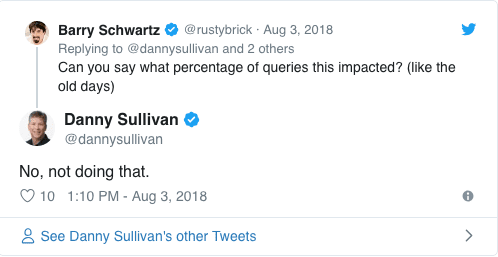
A little context here, for those who might not know. Danny Sullivan and Barry Schwartz are SEO bros who go way back. They worked together for over a decade at Search Engine Land. But then Danny crossed over from SEO guru to Google liason. However, as you can see, he wouldn’t even give his old mate a crumb.
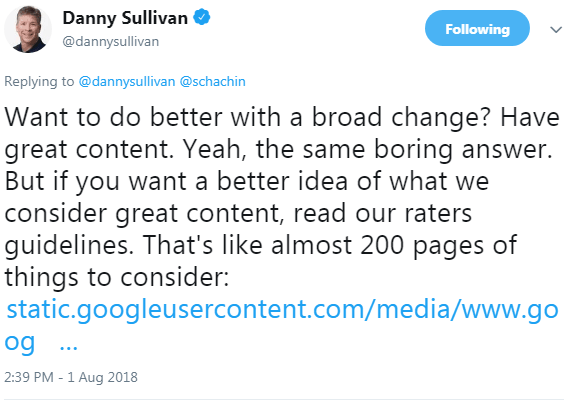
His response – and so by proxy Google’s – on how to deal with lost rankings stayed relatively vague and ranged from “create great content” to taking another look at Google’s Quality Raters Guidelines.
However, several months in, the general consensus of the SEO community is that the target of the August 2018 update was E-A-T markers. E-A-T is a term that found its way into the Google Quality Rater’s Guidelines shortly before the update and it also makes sense from the analysis. It stands for:
Expertise — How knowledgeable a site owner or content author is on the subject matter they are writing/talking about. This is especially important for the aforementioned YMYL sites.
Authoritativeness — The credibility of the website publishing the content. This includes any credentials, outside reviews, testimonials etc.
Trustworthiness — How trustworthy the site in question is. It means overall site quality and especially factors like site security.
Basically the E-A-T guidelines are all about evaluating whether or not users can trust you and your website. The goal of weighting them more heavily in the search algorithm is, as usual, Google would say, to provide their searchers the best possible results for their queries.
How to Implement Google E-A-T Guidelines
By now, your biggest question is probably how you can avoid being demoted in the SERPs on grounds of E-A-T or, if you already think you got hit, how you can recover. Bearing in mind that there are NO definitive answers or guarantees here, as is the case for everything SEO (and if anyone ever tells you otherwise they are telling porkies), here’s a look at some best practices to implement going forward.
Be Honest With Yourself About What You Are Doing Right Now
Something that too many people don’t get – including some SEOs – is that search engine optimization at the end of the Noughties is not about finding ways to ‘trick’ Google and other search engines into sending you traffic. Instead it’s about understanding why Google keep implementing these annoying updates and why you should be onboard with aligning with their goals.
Google lead the search world. They want it to stay that way. So they have to make sure that they continually strive to deliver their users the most relevant and high-quality results. And that should be your goal too.
So, the first step here is to take a long, hard, honest look at the state of your website and its content right now. If you have a great website, product, service, business etc that gets lots of good reviews and positive press and offers genuinely useful content that readers can trust, you will get that SERP boost because that’s what Google wants to see. But do you?
Anything that could be considered sketchy, spammy or irrelevant needs to come off your site now. End of story.
Pay Attention to Your About Pages
Often About Pages are afterthoughts. They cannot be anymore. Actually, Google has been telling us FOR YEARS how much they value About Pages but a lot of people just haven’t been listening hard enough. And it’s not just Google who care.
As the Internet becomes even more crowded – and the world debates concepts like ‘fake news’ and deliberately misleading content – people want to know who is behind the site they are on and whether or not they are to be trusted.
So, About Pages are a great way to do that. They are the perfect place to add those E-A-T markers that Google are looking for. So they should (at a minimum) include things like
- Experience and/or expert status of you and/or team members
- Awards you have won or been nominated for. Like we do at Pearl Lemon:
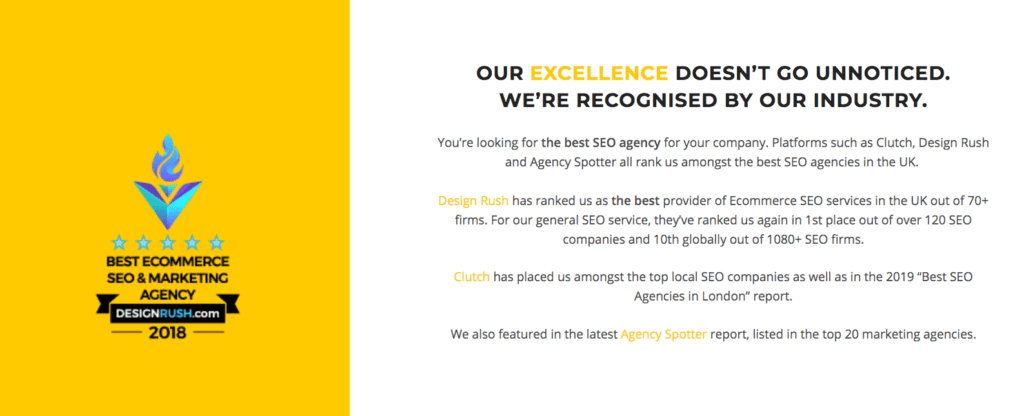
- Positive press about you, your company and your staff
Testimonials from clients - Academic titles or other formal qualifications
- Business address and contact details
If you haven’t looked at your About page in a while, chances are there is a lot of this missing. Time to change that.
Demonstrate the Expertise of Everyone on Your Site and Give Them a Human Face
What goes for your site in general also applies to the people working on it and within your business. If you mention anyone you need to demonstrate their expertise and the fact that they are a real person. Users – and Google – are tired of fake names and made up personas. They are tired of false claims of past glories that can’t be verified.
What belongs in these kinds of profiles that will appeal to the Google E-A-T algorithm update? Here are some ideas:
Speaking engagements and conferences and industry events
Important companies they work for or have in the past
Academic qualifications and certifications
Awards they have won
Proof that they are humans. With interests. And lives.
In short, pretty similar information as that you should be providing for your business on the whole but on the individual level. For example, on this site – and over at my company site Pearl Lemon – I share a lot of information about myself, both professional and personal. From an SEO standpoint it’s good for E-A-T and, as it’s unique content, general SEO.
https://youtu.be/NNMTP-yKAiA
But I have also found that it builds a connection – and a certain level of trust – between those I eventually work with and myself before we ever talk or meet. They already know who I am and a bit about what I’ve done and can do, and so a connection has already been made. And we do the same for all the team at Pearl Lemon. People already get we’re real, so therefore a bit more trustworthy from the start.
Manage Your Reputation
Just as general SEO isn’t just about on-page optimization but also off-page measures, E-A-T also concerns your site and company’s off page rep. This means making sure that your reputation around the Internet is as good as possible. How can you do that?
Get Some Press Coverage — If there is a way you can get featured on reputable news sites, by all means, just do it. Just a quick caveat: Google is pretty good at figuring out when coverage was bought vs when someone gives their real opinion. So, don’t pay for play.
Reviews — Same as for the press coverage. Get featured on sites in your niche and have others review what you have to offer. Again, that supposes reviews are likely to be positive. If not, you have a whole different problem.
Guest posts — To build E-A-T for yourself and your team, it’s also a good idea to get featured on other sites with good reputations.
Testimonials — Collect feedback from clients and customers and post it on your site.
Do a Content Audit
Content is as important for E-A-T as it is for SEO in general. If it’s expertly written, informative, trustworthy and authoritative it will boost your E-A-T just by existing.
Making a promise that this is all you will offer going forward is great, but you will also have to go back. People usually get better at what they do over time, so the chances are that some of your older content IS NOT as good as the new stuff.
Some of it may be out of date. Some of it may be inaccurate because you just simply did not know as much about the topic covered then as you do now. And some of it just might be bad because bad writers or creators were all you could afford back then.
You have choices here. You can improve it and update it, or you can get rid of it. If analytics show it has driven traffic in the past, you may want to hang on to it but change it enough that it now truly represents who you are.
Final Words
The Google E-A-T algorithm update was just another in a long line of such updates and there will be another one along soon, followed by another one a little after that. Seriously, just look at them. There is a huge list of them here. And that’s one of the biggest keys of good SEO. The knowledge that you will need to change and adapt your strategies often.
But, to be fair, the Google E-A-T algorithm update did a little more. If being considered the best, most relevant and most trustworthy source of information and offerings in your niche has always been your goal and everything on your site reflects this, then there is little you’ll have to do now you’ve finished reading this. But I doubt if that’s the case.
Big sites took a hit for a reason. They had not made sure that they lived up to E-A-T guidelines, and they had tons of cash and resources – as well as the bigger ‘name’ – to do so. We have had to take a long hard look at some of our content and yes, make some decisions about what stayed, what went and what needed to change. And I think, if you are really honest with yourself, you will find that you have to do the same.

